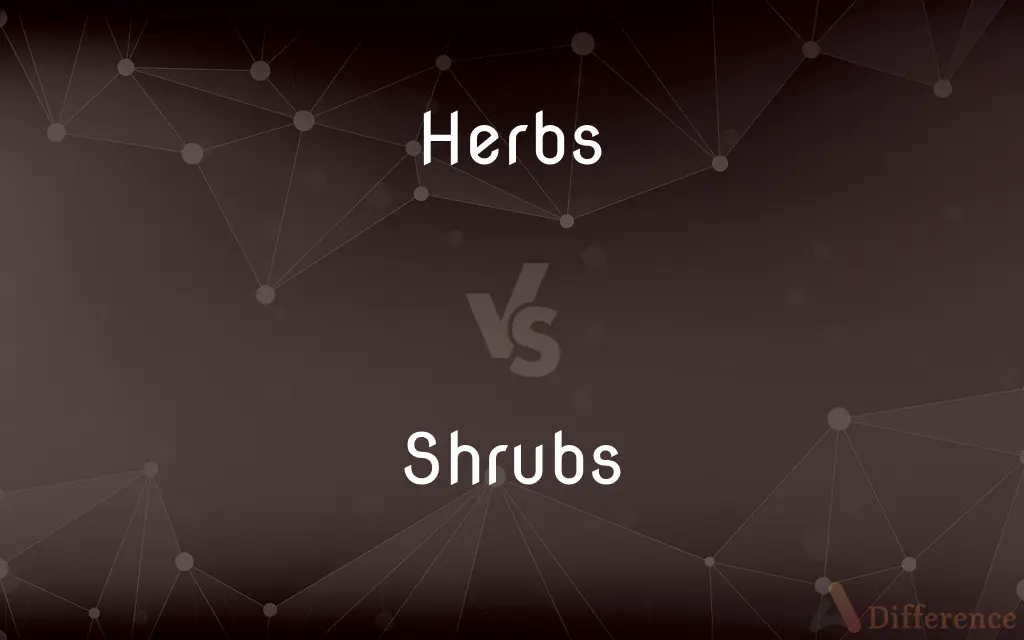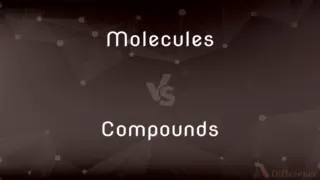Herbs vs. Shrubs — What's the Difference?
By Tayyaba Rehman — Published on January 16, 2024
Herbs are generally small, non-woody plants, often with medicinal or culinary uses, while shrubs are larger, woody plants with multiple stems.

Difference Between Herbs and Shrubs
Table of Contents
ADVERTISEMENT
Key Differences
Herbs are typically small, soft-stemmed plants often used for culinary, medicinal, or aromatic purposes. Shrubs, on the other hand, are larger, woody plants that can form the understory in forested areas.
Herbs are characterized by their green, tender stems and usually have a shorter life cycle. Shrubs, however, have a woody, branching structure and are generally more durable and long-lived.
In gardening and cooking, herbs like basil and mint are favored for their flavorful leaves. Shrubs, such as holly and rose bushes, are valued for their ornamental properties and ability to provide structure in landscapes.
Herbs often require less space to grow and can thrive in small pots or gardens. Shrubs need more space, as they can grow much larger and are often used as hedges or border plants.
The life cycle of herbs is usually annual or biennial, meaning they complete their life cycle in one or two seasons. Most shrubs are perennial, living for several years and often changing appearance with the seasons.
ADVERTISEMENT
Comparison Chart
Stem Type
Non-woody, tender.
Woody, branching.
Size
Generally small.
Larger, more robust.
Life Cycle
Often annual or biennial.
Mostly perennial.
Uses
Culinary, medicinal, aromatic.
Ornamental, landscaping.
Growth Requirements
Less space, suitable for pots.
More space, used as hedges/borders.
Compare with Definitions
Herbs
Herbs are small plants with aromatic or flavorful properties.
Basil, a popular herb, is often used to add flavor to Italian dishes.
Shrubs
Shrubs are perennial plants used for landscaping and decorative purposes.
Azaleas, popular shrubs, are known for their vibrant flowers in spring.
Herbs
Herbs are non-woody plants used in cooking, medicine, or perfumes.
Lavender, an herb, is widely used for its fragrance and medicinal qualities.
Shrubs
Shrubs are versatile plants used in gardens for structure and beauty.
Forsythia shrubs are known for their bright yellow blooms in early spring.
Herbs
Herbs are usually annual or biennial plants with soft stems.
Parsley, an annual herb, is often used as a garnish in various dishes.
Shrubs
Shrubs have a branching growth habit and can live for many years.
The rose bush, a fragrant shrub, is a staple in many gardens.
Herbs
Herbs are plants with culinary, therapeutic, or aromatic uses.
Mint, a versatile herb, is used in both culinary dishes and herbal teas.
Shrubs
Shrubs are woody plants smaller than trees and often used as hedges.
Boxwood shrubs are frequently used to create formal garden borders.
Herbs
Herbs are small plants used for their leaves, seeds, or flowers.
Cilantro, an herb, is commonly used in Mexican and Asian cuisines.
Shrubs
Shrubs are medium-sized, woody plants with multiple stems.
The hydrangea, a colorful shrub, is commonly used in ornamental gardening.
Herbs
A plant whose stem does not produce woody, persistent tissue and generally dies back at the end of each growing season.
Shrubs
A woody plant of relatively low height, having several stems arising from the base and lacking a single trunk; a bush.
Herbs
Any of various often aromatic plants used especially in medicine or as seasoning.
Shrubs
A beverage made from fruit juice, sugar, and a liquor such as rum or brandy.
Herbs
Plural of herb
Shrubs
Plural of shrub
Common Curiosities
Can shrubs be used for privacy?
Yes, shrubs are often planted as hedges for privacy and boundary definition.
Can herbs grow back every year?
Some herbs are perennials and can grow back each year, while others are annuals or biennials.
Do shrubs require pruning?
Yes, many shrubs benefit from regular pruning to maintain shape and health.
Do herbs need a lot of sunlight?
Most herbs prefer a sunny location to grow well.
Do shrubs attract wildlife?
Yes, many shrubs attract birds and insects with their flowers and berries.
Are herbs typically used in cooking?
Yes, many herbs are used in cooking for their flavor-enhancing properties.
Are all shrubs evergreen?
Not all shrubs are evergreen; some are deciduous and lose their leaves in winter.
How long do herbs live?
The lifespan of herbs varies; annuals live one season, biennials two, and perennials several years.
Can herbs be grown indoors?
Many herbs can be grown indoors on a sunny windowsill.
Are shrubs affected by frost?
Some shrubs are frost-tolerant, while others may need protection in colder climates.
Are shrubs suitable for container gardening?
Some smaller shrubs can be grown in containers, but they generally prefer open ground.
How much water do shrubs need?
Watering needs vary among shrubs, but most require consistent moisture, especially when establishing.
Can herbs be used in teas?
Yes, herbs like mint, chamomile, and lavender are often used in herbal teas.
Do herbs have medicinal properties?
Many herbs are known for their medicinal properties and have been used traditionally for health.
Can herbs be used for pest control?
Certain herbs, like basil and lavender, are known to repel pests naturally.
Share Your Discovery

Previous Comparison
Christian Bible vs. Jewish Bible
Next Comparison
Molecules vs. CompoundsAuthor Spotlight
Written by
Tayyaba RehmanTayyaba Rehman is a distinguished writer, currently serving as a primary contributor to askdifference.com. As a researcher in semantics and etymology, Tayyaba's passion for the complexity of languages and their distinctions has found a perfect home on the platform. Tayyaba delves into the intricacies of language, distinguishing between commonly confused words and phrases, thereby providing clarity for readers worldwide.














































